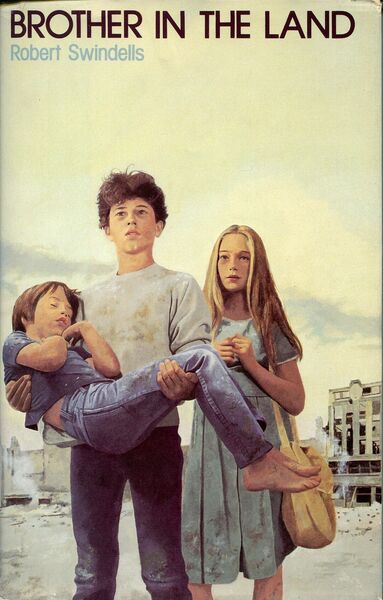This Dervish Frenzy
Brother in the Land
By Robert Swindells

23 Jan, 2025
Robert Swindells’ 1984 Brother in the Land is a stand-alone post-apocalypse novel.
Caught in a sudden downpour, teenager Danny Lodge takes shelter in a convenient World War Two-era bunker. Not only does this protect Danny from the rain, it protects him from the Soviet nuclear warhead that detonates in nearby Branford.
Well, the bunker protects Danny from the immediate effects.
Danny’s family does not live in Branford, but a few kilometres away in Skipley. This is far enough to avoid incineration, but not far enough to be spared flash burns or blast effects. Once-thriving Skipley is now a scene of ruins and corpses.
The Lodges get off easy. While their shop is wrecked, many of the contents are salvageable. Moreover, only Danny’s mother died in the attack. Danny’s father is alive, if traumatized. Danny’s younger brother Ben seems hardly bothered by the sudden up-ending of his world.
While the wreckage of their store provides shelter and food for the moment, that is only a short-term solution. The Lodges take comfort in the belief that somewhere beyond the ruins, something of old Britain survives. If they can only hold out long enough, fending off bandits, cannibals, and worse, surely official relief will arrive to restore normalcy.
Remnants of the government do survive, in the form of the Local Commission. Safely ensconced in shelters under Kershaw Farm, officials and soldiers were spared flash and blast. Radiation suits shield them from lingering fallout. The Local Commission has a plan, but relieving Skipley isn’t part of that plan.
First, there’s the matter of all the wounded. These are invited to the Local Commission Hospital near Kershaw Farm. Treatment is lead, delivered through a pistol barrel. The Commission provides the able-bodied with rations… some of which are poisoned to further reduce surplus head-count. Any existing stores are confiscated. Survivors are offered the choice of starvation or becoming uncompensated farm laborers, clearing away radioactive topsoil for as long it takes radiation to kill them.
Not everyone submits. Farmer Sam Branwell founds the Movement to Arm Skipley Against Dictatorial Authority, AKA MASADA. MASADA offers an alternative to the Local Commission. As long as MASADA stands, freedom survives!
Which means getting rid of MASADA is very high on the Local Commission’s to-do list. If only Branwell had spend as much time protecting the MASADA well from poisoning as long as he did coming up with a cool acronym.
~oOo~
In the Local Commission’s defense, they’re just carrying out the usual lifeboat rules program so common in SF books of this sort. It’s just that the author for some reason isn’t telling the story from the perspective of the Clear-Eyed Men Who Do What’s Hard But Necessary, but from that of the people to whom what’s‑hard-but-necessary is done. It’s that sort of creative choice that gives callous mass murder a bad name.
Britain’s Protect and Survive provided valuable advice re surviving the effects of a nuclear war. Protect and Survive seems to have been tremendously inspirational in its way, referenced in a number of British nuclear war stories.
What Protect and Survive does not appear to have been is in any way persuasive. British authors appear to have been curiously skeptical that a spot of white paint strategically applied, hastily assembled shelters, and repurposed polyethylene body bags would be efficacious. How peculiar that people living in a nation whose small size and densely packed population were especially vulnerable to hydrogen bombing would act as though they were people living in a nation whose small size and densely packed population were especially vulnerable to hydrogen bombing.
There are two versions of this novel. In a later edition, an extra chapter was added, providing a hopeful ending. My edition is the original ending.
The book purports to be an account written and hidden away by Danny, after he, his girlfriend Kim, and his brother Ben flee Skipley for what they hope will be a safe haven. It’s supposed to have been written before they reached safety… which leaves the possibility open that they didn’t make it. As this is a novel in which hope is in extremely short supply and almost always misguided, the reader is free to conclude that the refugees don’t make it.
Danny’s history is not intended as a feel-good account of how he and his companions survived. It is a plea to the future not to repeat the mistakes that killed civilization in the story.
Swindells had a very clear vision of the sort of book he wanted to deliver to his audience. His clear prose and straightforward characters effectively convey to young readers what awaits them should they be unluckily enough to survive the immediate effects of a nuclear war. Perhaps the author hoped to persuade his readers to work to prevent the apocalypse. It may have worked. We’ll see, won’t we?
Brother in the Land is available here (Amazon US), here (Amazon Canada), here (Amazon UK), here (Apple Books), here (Chapters-Indigo), and here (Words Worth Books). I did not find Brother in the Land at Barnes & Noble.
Chapters-Indigo also offers a playscript of Brother in the Land, aimed at grades Grade 6 – 9. Perfect for school kids tired of staging productions of Old Yeller and Watership Down.
